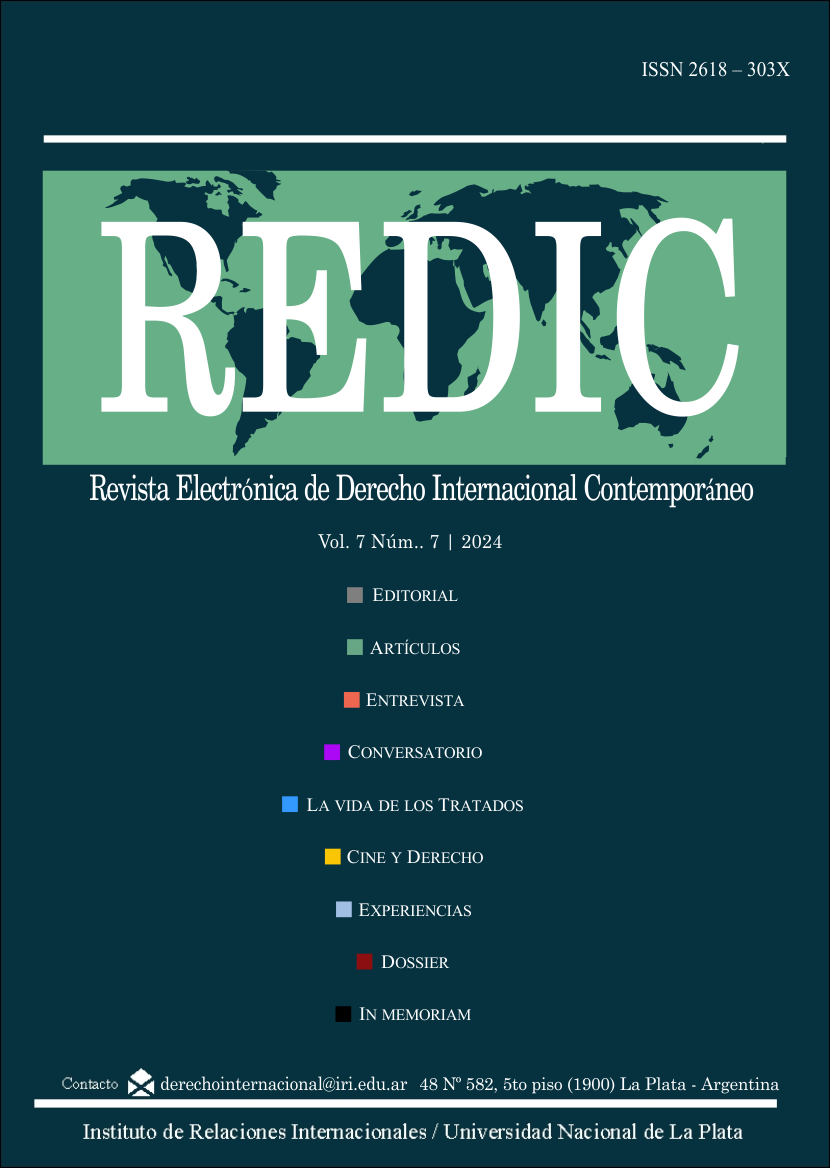Erga omnes obligations as key pieces to build community and fair relations
DOI:
https://doi.org/10.24215/2618303Xe071Keywords:
erga omnes obligations, international comunity, morality, international law, solidarityAbstract
Recognition of erga omnes obligations in caselaw and legal opinions is considered revolutionary, given how different their dynamics are in comparison to reciprocity-based duties. However, the legitimacy and authority that they provide so that third parties may demand their enforcement are just of of their manyfold significant implications, which may be legal or otherwise. They both are based on how such duties point to the existence of international community values. The international legal community dimension is not limited to granting authorization. Occasionally, it goes even further and requires international law subjects to make diligent efforts to guarantee that any legal assets protected by it be respected, reversing ongoing illegal acts. Just as much as it has been claimed that, from an ethical perspective, vitiated legal rules should not be obeyed, the characteristics of erga omnes obligations and a moral consideration of a “single dependence” may lead to the recognition of third parties' legal and non-legal burdens to resort to the optiones offered, in order to protect those who are in vulnerable situations.
Downloads
References
Arpaly, N. (2015). Huckleberry Finn Revisited: Inverse Akrasia and Moral Ignorance. En R. Clarke, M. McKenna y A. M. Smith (Eds.), The Nature of Moral Responsibility: New Essays (pp. 141-156). Oxford University Press.
Becker Lorca, A. (2014). Mestizo International Law: A Global Intellectual History 1842-1933. Cambridge University Press.
Bianchi, A. (2016). International Law Theories: An Inquiry into Different Ways of Thinking. Oxford University Press.
Campbell, S. M. (2012). The early Heidegger’s Philosophy of Life: Facticity, Being, and Language. Fordham University Press.
Carrillo Santarelli, N. (2008). La inevitable supremacía del ius cogens frente a la inmunidad jurisdiccional de los Estados. Revista Jurídica Universidad Autónoma de Madrid, (18), 55-82.
Carrillo-Santarelli, N. (2 de enero de 2018). The Role of Emotions in the Processes of Interaction with International Law. E-International Relations. https://www.e-ir.info/2018/01/02/the-role-of-emotions-in-the-processes-of-interaction-with-international-law/
Carrillo-Santarelli, N. (2023). On the Virtuousness of Certain Refusals to Comply with Legal Demands Prompted by Other Normativities. Díkaion, 32(1), 1-52, e32122. https://doi.org/10.5294/dika.2023.32.1.22
Carrillo-Santarelli, N. (2017). Direct International Human Rights Obligations of Non-State Actors: A Legal and Ethical Necessity. Wolf Legal Publishers.
Cepillo Galvín, M. A. (2021). Sociedad internacional, comunidad internacional, humanidad y Derecho Internacional en la actualidad. Revista de Relaciones Internacionales de la UNAM, (141), 13-38. https://www.revistas.unam.mx/index.php/rri/article/view/82483
Chang, Y. L. (2022). Communitarianism, Properly Understood. Canadian Journal Of Law & Jurisprudence, 35(1), 117-139. https://doi.org/10.1017/cjlj.2021.21
Clapham, A. y Jerbi, S. (2001). Categories of Corporate Complicity in Human Rights Abuses. Hastings International & Comparative Law Review, 24, 339-349.
Clarke, R. (2022). Responsibility for Acts and Omissions. En D. K. Nelkin y D. Pereboom (Eds.), The Oxford Handbook of Moral Responsibility (pp. 91-110). Oxford University Press.
El Fadl, K. A. (2013). The Islamic Legal Tradition. En M. Bussani y U. Mattei (Eds.), The Cambridge Companion to Comparative Law (pp. 295-312). Cambridge University Press.
Galang, J. R., Gopez, J. M. W., Capulong, H. G. M. y Gozum, I. E. A. (2021). Solidarity as a companion virtue in response to the COVID-19 pandemic. Journal Of Public Health, 43(2), e315-e316. https://doi.org/10.1093/pubmed/fdab024
Garlington, S. B., Collins, M. E. y Durham Bossaller, M. R. (2019). An Ethical Foundation for Social Good: Virtue Theory and Solidarity. Research On Social Work Practice, 30(2), 196-204. https://doi.org/10.1177/1049731519863487
Gómez Robledo, A. (2003). El ius cogens internacional: Estudio histórico-crítico. Universidad Nacional Autónoma de México.
Hershovitz, S. (2023). Law is a Moral Practice. Harvard University Press.
Higgins, R. (1995). Problems & Process: International Law and How We Use It. Oxford University Press.
James, S. M. (2007). Good Samaritans, Good Humanitarians. Journal Of Applied Philosophy, 24(3), 238-254. https://doi.org/10.1111/j.1468-5930.2007.00378.x
Kant, I. y Kleingeld, P. (2008). Toward Perpetual Peace and Other Writings on Politics, Peace, and History. Yale University Press.
Kelsen, H. (1982). Teoría pura del derecho. Universidad Nacional Autónoma de México.
Kiss, A. (s.f.). Abuse of Rights. In Max Planck Encyclopedia of Public International Law. Oxford University Press. Recuperado el 4 de octubre de 2024 de https://opil.ouplaw.com/display/10.1093/law:epil/9780199231690/law-9780199231690-e1371
Klabbers, J. (2021). International Law. Cambridge University Press.
Krieger, H. (16 de octubre de 2024). Mega-Political Cases before the ICJ: Transforming a Hegemonic into a Negotiated Order? CIL Dialogues: An International Law Blog. https://cil.nus.edu.sg/blogs/mega-political-cases-before-the-icj-transforming-a-hegemonic-into-a-negotiated-order/
Longobardo, M. (2024). Alleged Violations of the Duty to Ensure Respect for IHL and the Monetary Gold Principle. EJIL: Talk! Blog of the European Journal of International Law. http://dx.doi.org/10.2139/ssrn.4760848
Mantovani, D. (2022). From ‘Respondere’ to ‘Responsibility’. En S. Besson (Ed.), Theories of International Responsibility Law (pp. 27-42). Cambridge University Press.
McDougal, M. S. y Lasswell, H. D. (1959). The Identification and Appraisal of Diverse Systems of Public Order. American Journal Of International Law, 53(1), 1-29. https://doi.org/10.2307/2195211
McGarry, B. (2023). Obligations Erga Omnes (Partes) and the Participation of Third States in Inter-State Litigation. The Law & Practice Of International Courts And Tribunals, 22(2), 273-300. https://doi.org/10.1163/15718034-bja10099
Noortmann, M. y Ryngaert, C. (2010). Non-State Actors: Law-Takers or Law-Makers? Is That the Question? En M. Noortmann y C. Ryngaert (Eds.), Non-State Actor Dynamics in International Law: From Law-Takers to Law-Makers (pp. 195-202). Ashgate.
Parfitt, D. (2011). On What Matters. Oxford University Press.
Parlett, K. (2011). The Individual in the International Legal System: Continuity and Change in International Law. Cambridge.
Peters, A. (2023) The war in Ukraine and legal limitations on Russian vetoes. Journal On The Use Of Force And International Law, 10(2), 162-172. https://doi.org/10.1080/20531702.2023.2264085
Remiro Brotóns, A., Ruiquelme Cortado, R. M., Orihuela Calatayud, E., Díez Hochleitner, J. y Pérez-Prat Durbán, L. (2010), Derecho internacional: curso general. Tirant Lo Blanch.
Schwarz, E. y Renic, N. (7 de octubre de 2024). Beyond Law: Reaffirming the Centrality of Ethics in War. Just Security. https://www.justsecurity.org/103464/beyond-law-reaffirming-the-centrality-of-ethics-in-war/
Sen, A. (2004). Elements of a Theory of Human Rights. Philosophy & Public Affairs, 32(4), 315-356. https://doi.org/10.1111/j.1088-4963.2004.00017.x
Silk, J. B. y House, B. R. (2011). Evolutionary Foundations of Human Prosocial Sentiments. En J. E. Strassmann, D. C. Queller, J. C. Avise y F. J. Ayala (Eds.), In the Light of Evolution, Volume V: Cooperation and Conflict (pp. 343-363). The National Academies Press.
Silk, J. B., y House, B. R. (2016). The evolution of altruistic social preferences in human groups. Philosophical Transactions Of The Royal Society B.: Biological Sciences, 371(1687), 20150097. https://doi.org/10.1098/rstb.2015.0097
Slaughter, A. y Hale, T. (s.f.). International Relations, Principal Theories. In Max Planck Encyclopedia of Public International Law. Oxford University Press. Recuperado el 4 de octubre de 2024 de https://opil.ouplaw.com/display/10.1093/law:epil/9780199231690/law-9780199231690-e722
Trahan, J. (2023). Legal Issues Surrounding Veto Use and Aggression. Case Western Reserve Journal Of International Law, 55(1), 93-146.
Virally, M. (1998). El devenir del derecho internacional: Ensayos escritos al correr de los años. Fondo de Cultura Económica.
Wewerinke-Singh, M., Garg, A. y Agarwalla, S. (2023). In Defence of Future Generations: A Reply to Stephen Humphreys. European Journal Of International Law, 34(3), 651-667. https://doi.org/10.1093/ejil/chad033
Wigard, K. (30 de septiembre de 2024). A Groundbreaking Move: Challenging Gender Persecution in Afghanistan at the ICJ. EJIL: Talk! Blog of the European Journal of International Law. https://www.ejiltalk.org/author/kyrawigard/
Additional Files
Published
How to Cite
Issue
Section
License
Copyright (c) 2024 Nicolás Carrillo-Santarelli

This work is licensed under a Creative Commons Attribution-NonCommercial-ShareAlike 4.0 International License.
Aquellos autores/as que tengan publicaciones con esta revista, aceptan los términos siguientes:
- Los autores/as conservarán sus derechos de autor y garantizarán a la revista el derecho de primera publicación de su obra, el cuál estará simultáneamente sujeto a la Licencia de reconocimiento de Creative Commons (BY-NC-SA) 4.0 que permite a terceros compartir la obra siempre que se indique su autor y su primera publicación esta revista, no se haga uso comercial, y si se remezcla, se transforma o se crea a partir del material, se debe distribuir bajo la misma licencia del original.
- Los autores/as podrán adoptar otros acuerdos de licencia no exclusiva de distribución de la versión de la obra publicada (p. ej.: depositarla en un archivo telemático institucional o publicarla en un volumen monográfico) siempre que se indique la publicación inicial en esta revista.
- Se permite y recomienda a los autores/as difundir su obra a través de Internet (p. ej.: en archivos telemáticos institucionales o en su página web) antes y durante el proceso de envío, lo cual puede producir intercambios interesantes y aumentar las citas de la obra publicada. (Véase El efecto del acceso abierto).





















